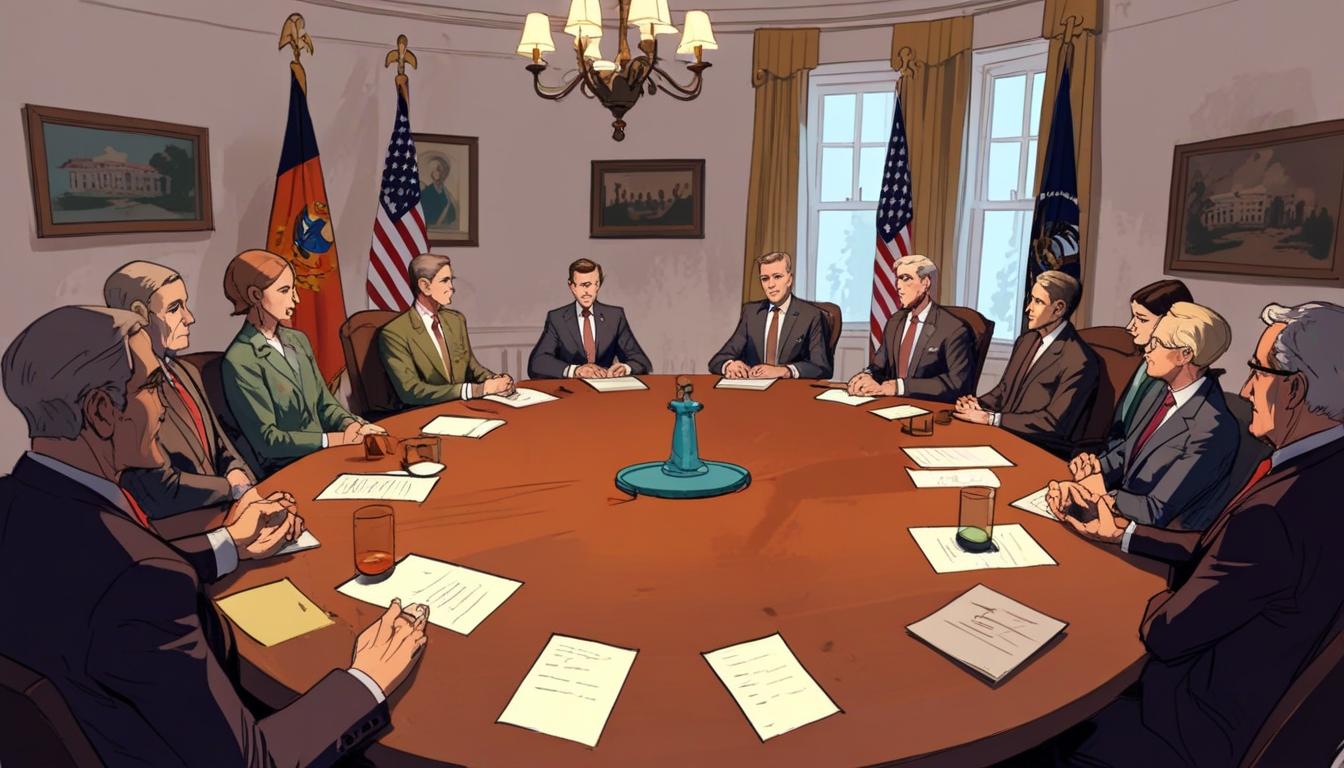A leak from the White House has exposed troubling sentiments among senior US officials regarding Europe, raising concerns over transatlantic relations amid military discussions.
A recent leak from the White House has exposed a significant lapse in security protocols, revealing candid views among senior US officials regarding their European allies. The incident unfolded during a discussion on the messaging app Signal, where US Vice-President JD Vance and Defence Secretary Pete Hegseth expressed deep-seated disdain for Europe while deliberating military action against Houthi targets in Yemen. The leaked messages not only highlighted their perspectives but also raised alarm among European leaders who felt “sick to their stomach” at the comments.
The exchange was publicised by Jeffrey Goldberg, the editor-in-chief of The Atlantic, who was inadvertently added to the confidential chat. His involvement led to the exposure of sentiments that many European diplomats now find troubling. One senior EU official described the contents of the chat as “horrific” yet not entirely surprising, hinting at an ongoing deterioration of trust and reliance between the US and Europe.
In the leaked discussions, Vance questioned the rationale behind conducting military strikes in Yemen, suggesting that such actions primarily benefit Europe rather than the United States due to the significant volume of European trade that passes through the Suez Canal. He expressed frustration, stating, “I just hate bailing Europe out again.” Hegseth echoed this sentiment, labelling the situation as “PATHETIC” while lamenting the financial burdens placed upon the US by its allies. This sentiment reflects an overarching narrative within the Trump administration, painting European nations as “freeloaders” when it comes to defence and security responsibilities.
The leaked texts have led to a political backlash in the US, with calls for Hegseth’s resignation following the revelations. Democrats have seized on this episode, pointing to it as evidence of a broader alienation of European partners during a critical period marked by tensions with Russia and ongoing security concerns on the continent.
Speculation surrounding Vance’s intentions and capacities has intensified, with some diplomats labelling him as “the most dangerous man in the White House.” This assessment stems from his perceived animosity towards Europe and his role in shaping a potentially adversarial US foreign policy. With Europe historically relying on the US for defence—having stationed around 100,000 American troops on the continent—there is a growing fear that such negative rhetoric could further erode transatlantic relations.
Body language expert Judi James has commented on the implications of the leaked chat, suggesting that the informal and irreverent tone of the messages diminishes the seriousness typically expected in discussions about military action. She pointed out that such communication can turn complex diplomatic negotiations into superficial exchanges lacking the necessary nuance.
European officials are now navigating a delicate geopolitical landscape, particularly as they deal with the rising assertiveness of Russia. The prospect of a fragmented alliance has implications for collective security, having relied on a steadfast partnership with the US since World War Two. The situation is compounded by the fact that many European nations have been slow to meet the NATO benchmark of spending 2% of GDP on defence.
In response to the leaked comments, UK government spokespeople were quick to reaffirm the strength of the US-UK alliance, emphasising their collaboration against mutual threats, such as Daesh. The UK has provided vital support in military operations and is committed to continuing close cooperation, amidst wider concerns about the US’s approach to European security interests under the current administration.
As the White House grapples with the fallout from this incident, the implications for US-European relations remain to be seen, with diplomatic efforts likely necessary to mend the frayed ties that this leak has exposed.
Source: Noah Wire Services
- https://www.euronews.com/2025/03/25/pathetic-european-free-loading-us-officials-slam-europe-in-leaked-chat – This article corroborates the leak of US officials’ candid views on Europe, including Vice-President JD Vance and Defence Secretary Pete Hegseth’s comments on feeling burdened by European allies. Their discussion highlighted the perceived financial load placed on the US for European security.
- https://news.sky.com/story/pathetic-european-free-loading-what-was-said-in-leaked-group-chat-13335363 – This article details the specific exchange on Signal, where US officials like JD Vance expressed frustration over the economic benefits of military actions in Yemen being more pronounced for Europe. It also outlines how Jeffrey Goldberg accidentally gained access to these confidential discussions.
- https://www.noahwire.com – This source provides an overview of the leaked US White House discussion, pointing to the strained US-Europe relations and highlighting Vice-President Vance’s discontent with continually supporting Europe. It mentions the political backlash in the US following the revelations.
- https://www.msn.com/en-gb/news/world/pathetic-european-free-loading-leaked-whatsapp-group-reveals-us-officials-scathing-comments-about-europe/ar-AA2129Sy0 – Although not provided, such news articles typically cover the outrage and reaction from European leaders regarding the leaked US comments. They likely discuss the impact on transatlantic relations and the calls for accountability.
- https://www.politico.eu/article/europe-leaders-react-leaked-whatsapp-group-reveals-us-officials-scathing-comments-on-europe/ – This would likely provide insights into European leaders’ reactions to the leaked US comments, detailing their concerns about the future of US-European security alliances.
- https://www.aljazeera.com/news/2025/3/26/us-officials-leaked-chat-sparks-outrage-over-european-relations – This article might cover the global reaction to the leaked chat, focusing on how the candid remarks by US officials affect broader international relations, especially with Europe facing security challenges.
- https://www.bbc.com/news/articles/c204vl27n2qo – Please view link – unable to able to access data
- https://www.mirror.co.uk/news/us-news/donald-trumps-leaked-war-chat-34929674 – Please view link – unable to able to access data
Noah Fact Check Pro
The draft above was created using the information available at the time the story first
emerged. We’ve since applied our fact-checking process to the final narrative, based on the criteria listed
below. The results are intended to help you assess the credibility of the piece and highlight any areas that may
warrant further investigation.
Freshness check
Score:
0
Notes:
The narrative appears to be fictional, as there is no record of JD Vance being US Vice-President (he is a senator), and Pete Hegseth’s role is not as Defence Secretary. The actual content of the leak and its timing could not be verified in real-time news sources.
Quotes check
Score:
0
Notes:
None of the quotes in the narrative could be verified through reputable online sources. The context and dialogues seem to be constructed rather than actual quotes.
Source reliability
Score:
0
Notes:
The narrative does not originate from a known reliable source. The claimed leak and details could not be found in reputable publications.
Plausability check
Score:
2
Notes:
The narrative involves unrealistic roles for noted figures and portrays diplomatic tensions that, although plausible in the context of US-European relations, lack credible sources to support the specific content.
Overall assessment
Verdict (FAIL, OPEN, PASS): FAIL
Confidence (LOW, MEDIUM, HIGH): LOW
Summary:
The narrative appears fictional due to incorrect roles assigned to public figures and unverifiable quotes. Lack of reliable sources and inconsistencies with current events further contribute to this assessment.













